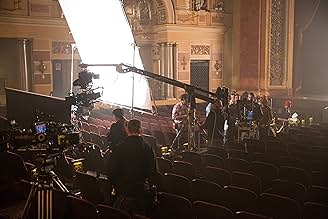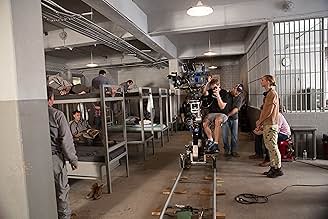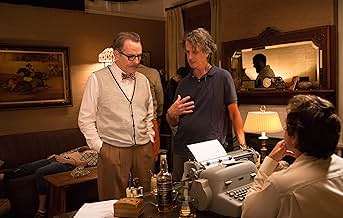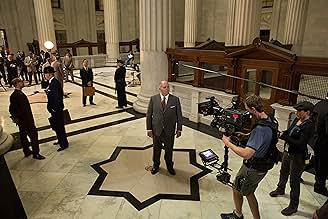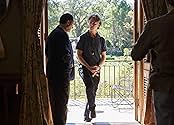En 1947, Dalton Trumbo était le meilleur scénariste d'Hollywood, jusqu'à ce que lui-même et d'autres artistes soient emprisonnés et mis sur liste noire pour leurs convictions politiques.En 1947, Dalton Trumbo était le meilleur scénariste d'Hollywood, jusqu'à ce que lui-même et d'autres artistes soient emprisonnés et mis sur liste noire pour leurs convictions politiques.En 1947, Dalton Trumbo était le meilleur scénariste d'Hollywood, jusqu'à ce que lui-même et d'autres artistes soient emprisonnés et mis sur liste noire pour leurs convictions politiques.
- Réalisation
- Scénario
- Casting principal
- Nommé pour 1 Oscar
- 8 victoires et 45 nominations au total
Toby Nichols
- Chris Trumbo (age 6-10)
- (as Tobias McDowell Nichols)
Avis à la une
9vsks
After practically having the frequently shown previews for Trumbo memorized, I finally saw the film itself. (Though one trailer scene with Helen Mirren didn't actually appear in the movie. Weird.) As you undoubtedly know, Trumbo is the story of the Hollywood 10, writers blacklisted during the communist witch-hunts of the late 1940s and 1950s. Joe McCarthy and all that. When called before the House Un-American Activities Committee, Dalton Trumbo (played beautifully by Bryan Cranston) and the other nine refused to give Congress information about their beliefs or to rat out others in the film industry. As a result, a number of them including Trumbo went to prison for contempt of Congress ("I AM contemptuous of Congress," he said after the HUAC hearing). He was in the slammer for 10 months and once he was out could no longer get work. Meanwhile, some industry personages—in the movie, producer Buddy Ross (Roger Bart) and actor Edward G. Robinson (Michael Stuhlbarg)—saw their careers going up in smoke and did testify (though in real life, Robinson did not name names). The movie effectively skewers that Great American Flag-Waving Hero, John Wayne, who managed to avoid any military service during World War II and Korea. "If you're going to act as if you won the war single-handedly," Trumbo tells him, "it would be more believable if you'd actually served," as he and so many of his black-listed colleagues had. They represent the tip of the iceberg of people harmed by the virulent anti-Communism of the day, and although the movie is about the Hollywood 10, it's really about the Hollywood One, Trumbo, the most accomplished of the lot. The composite character Arlen Hird has the unenviable job of being Trumbo's verbal sparring partner and representing an amalgam of several of the harder-line writers' views. Trumbo is unfailingly supportive of him, even though he inserts his political views into scripts (which Trumbo rewrites) and clearly doesn't trust Trumbo. (This is where the "You talk like a radical, but you live like a rich man" line from the trailer fits in.) While not a lot of acting was required of Diane Lane as Trumbo's wife, she did a fine job, and Helen Mirren is perfect as the odious Hedda Hopper, blackmailer without portfolio. As writer Hird, comedian Louis C.K.'s acting inexperience shows a bit, as he's up against such acting superstars, while John Goodman is all prickly geniality and Alan Tudyk plays a credible Ian McLellan Hunter. Hunter wins the Academy Award for the Roman Holiday script (the Gregory Peck, Audrey Hepburn classic), but Trumbo wrote it. In fact, Trumbo and the others write many screenplays for which they receive credit only belatedly, if at all. The back of the blacklist can't be broken until a few Hollywood luminaries are willing to give appropriate screen credit. Directed by Jay Roach with a solid script from John McNamara. While in their vision, the character of Trumbo doesn't change much over the course of the story—except perhaps to learn not to take what he most cherishes for granted—"he is no more or less principled at the end than he was at the start," said Anthony Lane in The New Yorker. He is forgiving, though, and in the end acknowledges that all humans are a mix of good acts and bad (except perhaps for Hedda Hopper). The real opportunity for learning lies with the audience. While those anti-Communist days may now seem rather quaint—Congress taking on a bunch of two-fingered typists—there always are people who believe they know best what other people should think, who believe others are too dim or inattentive to grasp hidden political messages, who think citizens are like children who have to be protected from difficult ideas. That, the movie Trumbo seems to say, is still the danger. Another film well worth the price of a ticket.
Trumbo is a period piece set in the late 40s and early 50s, following the life of Dalton Trumbo, arguably the leader of the Hollywood 10 who stood up to congress over what they saw as the illegal investigation and censorship of people's beliefs and free speech during the Second Red Scare after WWII. At the time, Congress and, in turn, members of the Hollywood elite blackballed writers, actors, directors, etc who identified as communists. Not spies for Moscow, but communists by political belief. Some faced jail time. Some lost their homes because they could not find work. Others encountered harsher realities. And Hollywood witch-hunt was merely a small part of a more wide-spread affront to civil liberties.
The time period itself is difficult to portray without seeming to be caricature - or perhaps style and communication have changed so much in 65 years that it just seems like caricature. Added to that difficulty are portrayals of John Wayne and Kirk Douglas, legends of film that, as a young person, I may have gone my whole life subconsciously thinking of as only existing on screen. Trumbo mostly rises to the occasion.
Much of Trumbo is comedic, and with intention, but the film also carries a certain amount of poignancy, if maybe a little less than it could use given the subject matter. Bryan Cranston is incredibly enjoyable to watch, and during the credits you get to watch a clip of the real Trumbo to compare. The portrayal is jarringly realistic (something you may question for the entirety of the film). Helen Mirren is a worthy antagonist, and very effectively displays the fear and anger that result from war - the need to dehumanize the enemy in order to survive the loss you feel as your family is fighting thousands of miles across the world, the need to justify pain through rigid ideology.
Other notable performances come from Michael Stuhlbarg, whose character, Eddie, provides for much of the films poignancy, and Diane Lane as the quiet but strong Cleo Trumbo, the rock of her family. John Goodman, is well cast as the comedic used car salesman of film, and Elle Fanning makes her mark as the rebellious daughter learning to be every bit of a force as her father.
It would be unfair to pin the failings of the film on a single person, but Louis C. K. continues to prove that being a great comedian does not make you a great actor. His portrayal is, in fact, so flat that it pulls you out of immersion in the film, a flaw that is further exacerbated by Bryan Cranston's mastery. Scenes between the two are simply absurd.
As a whole, the film's laughs are well earned and its feelings are well felt. Where the film falls short is to evoke, without personal reflection, the so obvious parallels between the state of our country today and that of the film. But perhaps that is not the goal. Perhaps the goal was to, with a bit of fun, portray a larger than life writer who decided to take on the world...and won. In that, Trumbo is a great success.
The time period itself is difficult to portray without seeming to be caricature - or perhaps style and communication have changed so much in 65 years that it just seems like caricature. Added to that difficulty are portrayals of John Wayne and Kirk Douglas, legends of film that, as a young person, I may have gone my whole life subconsciously thinking of as only existing on screen. Trumbo mostly rises to the occasion.
Much of Trumbo is comedic, and with intention, but the film also carries a certain amount of poignancy, if maybe a little less than it could use given the subject matter. Bryan Cranston is incredibly enjoyable to watch, and during the credits you get to watch a clip of the real Trumbo to compare. The portrayal is jarringly realistic (something you may question for the entirety of the film). Helen Mirren is a worthy antagonist, and very effectively displays the fear and anger that result from war - the need to dehumanize the enemy in order to survive the loss you feel as your family is fighting thousands of miles across the world, the need to justify pain through rigid ideology.
Other notable performances come from Michael Stuhlbarg, whose character, Eddie, provides for much of the films poignancy, and Diane Lane as the quiet but strong Cleo Trumbo, the rock of her family. John Goodman, is well cast as the comedic used car salesman of film, and Elle Fanning makes her mark as the rebellious daughter learning to be every bit of a force as her father.
It would be unfair to pin the failings of the film on a single person, but Louis C. K. continues to prove that being a great comedian does not make you a great actor. His portrayal is, in fact, so flat that it pulls you out of immersion in the film, a flaw that is further exacerbated by Bryan Cranston's mastery. Scenes between the two are simply absurd.
As a whole, the film's laughs are well earned and its feelings are well felt. Where the film falls short is to evoke, without personal reflection, the so obvious parallels between the state of our country today and that of the film. But perhaps that is not the goal. Perhaps the goal was to, with a bit of fun, portray a larger than life writer who decided to take on the world...and won. In that, Trumbo is a great success.
I've seen some mixed reviews of Trumbo, and in a way I can understand why it wouldn't impress some film critics. It is a movie where the movie business, and especially movie personalities, are given over to actors to play. It's not unlike a few years ago with the Anthony Hopkins Hitchcock: you got a big cast and they all have roles to play from people who, if you're a big movie buff (or even someone who just knows who Kirk Douglas or John Wayne were, and that's probably a lot, whether or not you know who Dalton Trumbo was entirely), there's an aspect of 'Oh, he's or she is playing HIM or HER!' But I think with a sharp enough script that sort of thing goes by the way-side, especially if it gives the right actors some good stuff to play. There's nothing about Trumbo that is especially complex, as it has the message that most of us in 2015 would agree with: the Hollywood Blacklist, not just what happened to the Hollywood 10 but many others, was a horrible thing, and the thesis comes down to the idea that there were good and bad people in it but it also came down to the nature of it all making people victims... well, except for Hedda Hopper.
The movie is fun though whether or not you know a lot about the history because of who is in the cast and especially Bryan Cranston as Trumbo. He's a man who makes a lot of money in the 40's in Hollywood writing scripts and yet is an avowed Communist (he makes the case to his daughter in such a way early on in the film that some might question but most of us would go 'huh, that's it then'). A lot of the conflict comes because of what the history had right there: HUAC went after people in Hollywood who were suspected 'traitors', but in reality were just writers and (some) actors and directors who had affiliations with the party, and thanks to pressure by columnist Hedda Hopper (played here by Helen Mirren in a role that's deliciously evil) and John Wayne (actor I can't remember but does a good impression without being caricature-ish), a group got pressured. They didn't name names, were held in contempt of court, found guilty and did time. Well, unless if you were Edward G. Robinson (though he's shown in a somewhat sympathetic light, maybe just by Michael Stuhlbarg being in the role).
The bulk of the story is about the 'front' that Trumbo led for himself and other blacklisted writers such as stubborn/cancer-ridden Arlen Hird (Louis CK, always a pleasure to watch, but especially in scenes with Cranston). They used fake names to get their scripts made, even as they had no choice for a while but to team up with filmmakers who were out to just make "crap" (an echo in a way for me of Burton's Ed Wood with the John Goodman character). There's some predictable drama that unfolds - the all-business-all-writing part of Dalton that conflicts with being a father and family-man and clashing with his daughter and wife (very good Elle Fanning and Diane Lane respectively) - but what helps it along all the way is just a sharp script and direction that keeps things thematically strong.
This is serious stuff what happened to these people in Hollywood, and director Jay Roach and writer John McNamara know that, all the way up to a final speech from Trumbo upon winning a WGA award that puts things into a perspective that (almost) makes Trumbo too fair to those who really wronged him and his friends. But it's just full of wit an clever lines; if you're a sucker for that, as I can be sometimes, then Trumbo makes for a balance of the light and dark stuff. Again if nothing else, Cranston makes someone who can easily be seen as a CHARACTER in bold letters (and by many accounts that is who Trumbo was) and gives him three dimensions and perspective on the situations that unfold. He does things that may be wrong and provocative, in both bad and good ways, and is told off enough that any of his short-comings become kind of charming. I could've spent more time with his Trumbo and been happy, especially in light of the history that unfolds here (i.e. Roman Holiday, Spatacus, Exodus, other productions like The Brave One).
The movie is fun though whether or not you know a lot about the history because of who is in the cast and especially Bryan Cranston as Trumbo. He's a man who makes a lot of money in the 40's in Hollywood writing scripts and yet is an avowed Communist (he makes the case to his daughter in such a way early on in the film that some might question but most of us would go 'huh, that's it then'). A lot of the conflict comes because of what the history had right there: HUAC went after people in Hollywood who were suspected 'traitors', but in reality were just writers and (some) actors and directors who had affiliations with the party, and thanks to pressure by columnist Hedda Hopper (played here by Helen Mirren in a role that's deliciously evil) and John Wayne (actor I can't remember but does a good impression without being caricature-ish), a group got pressured. They didn't name names, were held in contempt of court, found guilty and did time. Well, unless if you were Edward G. Robinson (though he's shown in a somewhat sympathetic light, maybe just by Michael Stuhlbarg being in the role).
The bulk of the story is about the 'front' that Trumbo led for himself and other blacklisted writers such as stubborn/cancer-ridden Arlen Hird (Louis CK, always a pleasure to watch, but especially in scenes with Cranston). They used fake names to get their scripts made, even as they had no choice for a while but to team up with filmmakers who were out to just make "crap" (an echo in a way for me of Burton's Ed Wood with the John Goodman character). There's some predictable drama that unfolds - the all-business-all-writing part of Dalton that conflicts with being a father and family-man and clashing with his daughter and wife (very good Elle Fanning and Diane Lane respectively) - but what helps it along all the way is just a sharp script and direction that keeps things thematically strong.
This is serious stuff what happened to these people in Hollywood, and director Jay Roach and writer John McNamara know that, all the way up to a final speech from Trumbo upon winning a WGA award that puts things into a perspective that (almost) makes Trumbo too fair to those who really wronged him and his friends. But it's just full of wit an clever lines; if you're a sucker for that, as I can be sometimes, then Trumbo makes for a balance of the light and dark stuff. Again if nothing else, Cranston makes someone who can easily be seen as a CHARACTER in bold letters (and by many accounts that is who Trumbo was) and gives him three dimensions and perspective on the situations that unfold. He does things that may be wrong and provocative, in both bad and good ways, and is told off enough that any of his short-comings become kind of charming. I could've spent more time with his Trumbo and been happy, especially in light of the history that unfolds here (i.e. Roman Holiday, Spatacus, Exodus, other productions like The Brave One).
I happened only 70 years ago and so many young people have never even heard about it. How can it be? And, how dangerous. Not to know will always put you at a disadvantage, oh yes, sooner or later. Trumbo feels like a story set in a totalitarian Country and yet...The spread of fear is a powerful weapon used by self-aggrandizing sociopaths. Joe McCarthy's success is still a mystery to me and Trumbo proves, in the most riveting way, how easily we can fall in that trap. Bryan Cranston is simply, sensational portraying a true American in all its contradictions. I never really thought of the actual degradation Trumbo and the other blacklisted writers went through until I saw it in Bryan Cranston's face. David James Elliott portrayal of John Wayne is chilling and disturbing, specially because id true. I've heard from people who knew him, what a nice man Duke was and yet...Helen Mirren as Hedda Hopper was another chilling and unexpected portrait of utter ignorance. I've only recently found out that she was behind the forces that wanted Charles Chaplin out of the Country. Congratulations to director Jay Roach and to a spectacular cast. Let's hope everyone pays attention.
I have seen so many documentaries about this era. The Hollywood blacklist, McCarthyism.
However, this takes a fresh, personal look at what happened. It shows how folks actually handled this, rather than just the circumstances of the time and newsreels of Congress hearings. How did they do it? This shows the how and when, the risks. Of course, Trumbo captures the full story of the persecution.
Stay to the very end of the film, stay for the credits as some of the clips they show are so meaningful.
I don't know if Trumbo was the person shown in the film, but if he was, he was an American hero. I think films like this represent the spirit, the best or worst of the spirit of what happened.
Trumbo wasn't just a hero from the look of it, he was also a survivor who made his way through the worst of it and came out on the other side.
However, this takes a fresh, personal look at what happened. It shows how folks actually handled this, rather than just the circumstances of the time and newsreels of Congress hearings. How did they do it? This shows the how and when, the risks. Of course, Trumbo captures the full story of the persecution.
Stay to the very end of the film, stay for the credits as some of the clips they show are so meaningful.
I don't know if Trumbo was the person shown in the film, but if he was, he was an American hero. I think films like this represent the spirit, the best or worst of the spirit of what happened.
Trumbo wasn't just a hero from the look of it, he was also a survivor who made his way through the worst of it and came out on the other side.
Le saviez-vous
- AnecdotesBryan Cranston revealed in a radio interview that Kirk Douglas approved of this movie, but his major complaint was that he wasn't asked to play himself.
- GaffesWhen the Oscar is presented for Best Screenplay at the 1954 Awards the presenter says, "And the Oscar goes to..." This phrase was not used by presenters until the 61st Academy Awards in 1989. In the 1950s the presenter would have said, "And the winner is..." when presenting an Oscar.
- Citations
Dalton Trumbo: Friends? What friends? Who the hell has the luxury of friends? I've got allies and enemies. There's no room for anything else.
- Crédits fousAs the credit scroll begins, photos of Dalton Trumbo, his family, and other people portrayed in the film are shown. These are followed by historical footage of Trumbo giving an interview (from the same one where he acknowledges that he is 'Robert Rich').
- Versions alternativesThe version of the movie that has been screened on Indian theaters and telecast in India is a PG-13 level cut that has been rated UA by the CBFC.
Meilleurs choix
Connectez-vous pour évaluer et suivre la liste de favoris afin de recevoir des recommandations personnalisées
- How long is Trumbo?Alimenté par Alexa
- What is the real-life story of the Hollywood blacklist depicted in "Trumbo"?
Détails
Box-office
- Budget
- 15 000 000 $US (estimé)
- Montant brut aux États-Unis et au Canada
- 7 857 741 $US
- Week-end de sortie aux États-Unis et au Canada
- 74 177 $US
- 8 nov. 2015
- Montant brut mondial
- 11 430 025 $US
- Durée2 heures 4 minutes
- Couleur
- Mixage
- Rapport de forme
- 1.85 : 1
Contribuer à cette page
Suggérer une modification ou ajouter du contenu manquant









